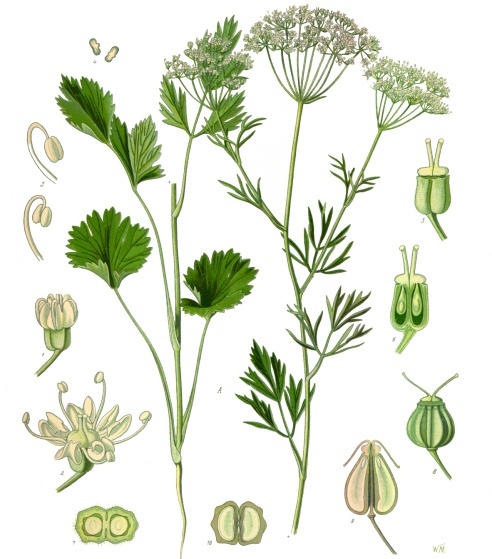 Anise
Anise
Common name
Aniseed, Anise Oil
ID
HD0070
Scientific name of the plant
Pimpinella anisum L.
Anatomical part for use
N/A
Human use
Cough and cold,Gastrointestinal disorders
Summary
Anise (, ; Pimpinella anisum), also called aniseed or rarely anix, is a flowering plant in the family Apiaceae native to the eastern Mediterranean region and Southwest Asia.The flavor and aroma of its seeds have similarities with some other spices, such as star anise, fennel, and liquorice. It is widely cultivated and used to flavor food, candy, and alcoholic drinks, especially around the Mediterranean.
Evidence Level
Level 0 (No convinced report of liver injury caused by herbal and dietary supplement)
Hepatotoxicity Description
N/A
Traditional medicine
The main use of anise in traditional European herbal medicine was for its carminative effect (reducing flatulence), as noted by John Gerard in his Great Herball, an early encyclopedia of herbal medicine:
The seed wasteth and consumeth winde, and is good against belchings and upbraidings of the stomach, alaieth gripings of the belly, provoketh urine gently, maketh abundance of milke, and stirreth up bodily lust: it staieth the laske (diarrhea), and also the white flux (leukorrhea) in women.
According to Pliny the Elder, anise was used as a cure for sleeplessness, chewed with alexanders and a little honey in the morning to freshen the breath, and, when mixed with wine, as a remedy for asp bites (N.H. 20.72). In 19th-century medicine, anise was prepared as aqua anisi ("Water of Anise") in doses of an ounce or more and as spiritus anisi ("Spirit of Anise") in doses of 5–20 minims. In Turkish folk medicine, its seeds have been used as an appetite stimulant, tranquilizer, or diuretic. (Source: Wiki)

Common name
Aniseed, Anise Oil
ID
HD0070
Scientific name of the plant
Pimpinella anisum L.
Anatomical part for use
N/A
Human use
Cough and cold,Gastrointestinal disorders
Summary
Anise (, ; Pimpinella anisum), also called aniseed or rarely anix, is a flowering plant in the family Apiaceae native to the eastern Mediterranean region and Southwest Asia.The flavor and aroma of its seeds have similarities with some other spices, such as star anise, fennel, and liquorice. It is widely cultivated and used to flavor food, candy, and alcoholic drinks, especially around the Mediterranean.
Evidence Level
Level 0 (No convinced report of liver injury caused by herbal and dietary supplement)
Hepatotoxicity Description
N/A
Traditional medicine
The main use of anise in traditional European herbal medicine was for its carminative effect (reducing flatulence), as noted by John Gerard in his Great Herball, an early encyclopedia of herbal medicine: The seed wasteth and consumeth winde, and is good against belchings and upbraidings of the stomach, alaieth gripings of the belly, provoketh urine gently, maketh abundance of milke, and stirreth up bodily lust: it staieth the laske (diarrhea), and also the white flux (leukorrhea) in women. According to Pliny the Elder, anise was used as a cure for sleeplessness, chewed with alexanders and a little honey in the morning to freshen the breath, and, when mixed with wine, as a remedy for asp bites (N.H. 20.72). In 19th-century medicine, anise was prepared as aqua anisi ("Water of Anise") in doses of an ounce or more and as spiritus anisi ("Spirit of Anise") in doses of 5–20 minims. In Turkish folk medicine, its seeds have been used as an appetite stimulant, tranquilizer, or diuretic. (Source: Wiki)